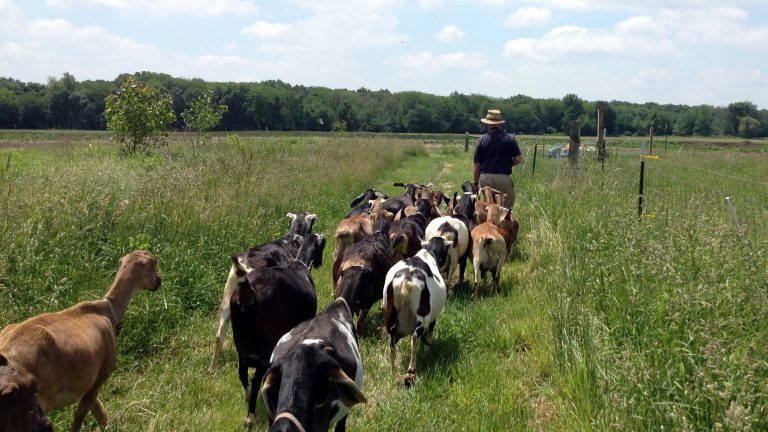It’s become a common sight at grocery stores across the country: empty shelves, devoid of essential food and household items.
Illinois, which is facing a stay-at-home mandate, is no exception.
When Governor J.B. Pritzker announced the three-week stay-at-home order, he deemed farmers markets and produce stands essential businesses. However, local food producers across the state are worried the market will look a lot different this year due to COVID-19.
“Oh, my. Our heads are spinning,” says Patty Marco, co-owner and operator of Wiltse’s Farm Produce in Maple Park, Illinois.
Wiltse’s is a fourth-generation, family-owned farm operated by Marco and her two siblings. They’re well-known for their sweet corn, but they grow all kinds of fruits and vegetables.

“The easiest thing I always say is that we grow A to Z, asparagus to zucchini, and everything in between,” Marco says.
It’s approaching planting season for that asparagus and zucchini, and Marco says all the uncertainty is making it really hard to plan.
“You kind of plan for the worst and hope for the best,” she says.
Wiltse’s primarily operates out of an old, red cattle barn that’s been converted into a roadside produce stand. They rely on customers visiting in person. On nice days, they offer “U-pick” items, where customers pick their own produce straight from the field.

But now, with COVID-19 spreading around the state and shelter-in-place orders in effect, Marco wonders whether they’ll be able to provide that for their customers this year.
“Can I put my tub of vegetables out for a person to pick? Or am I going to have to package everything so there’s less handling by the public? I don’t know, we don’t know,” she says.
Leslie Cooperband and her husband run Prairie Fruits Farm and Creamery in Champaign, Ill. They primarily raise goats for cheese and some other dairy products, like goat’s milk gelato.
Between kidding season and getting the creamery up and running, March is usually a busy month on the farm.
“We call it our version of March Madness,” she says. “It has nothing to do with basketball, it’s all about baby goats and milk and cheese.”
But this year, the month of March has looked a bit different.
According to Cooperband, they sell a lot of their products to local restaurants, which are currently restricted to carry-out orders or are shut down entirely. They also rely on one of the local farmers markets to sell their cheese, which is currently closed.
“It’s a big thing that’s weighing heavily on us,” she says.
Even if the market does reopen, Cooperband says they’re expecting attendance to be much lower than usual with shoppers wary of coming into close contact with other people.
Just like Patty Marco at Wiltse’s Farm Produce, Cooperband is struggling with the uncertainty.
“The reality shifting from hour to hour, day by day, it’s making it really hard to have any sense of how to plan,” she says.

Now, she’s coming up with alternative ways to sell her cheese. She’s dubbed her latest idea: “the cheese emergency kit.”
“[Customers] would be able to order cheese and accompaniments and then either have a drive-by out here at the farm, or we may be able to do some shipping,” Cooperband says.
The idea is to partner with other local farmers to include vegetables, meat and eggs along with her goat cheese.
“These are opportunities for collaboration and collective, you know, people aggregating their products together to get them to people who want it,” says Liz Moran Stelk, Executive Director of the Illinois Stewardship Alliance. “That’s a scale-up that we’ve been waiting for in the local food movement to come. And now it’s here because there’s this incredible demand.”
The Illinois Stewardship Alliance protects and promotes local food producers like Cooperband and Marco. Stelk says she’s been working on getting communities to rely on their local farmers for years.
She says this global pandemic could be the catalyst they desperately needed.
Follow Dana on Twitter: @DanaHCronin

